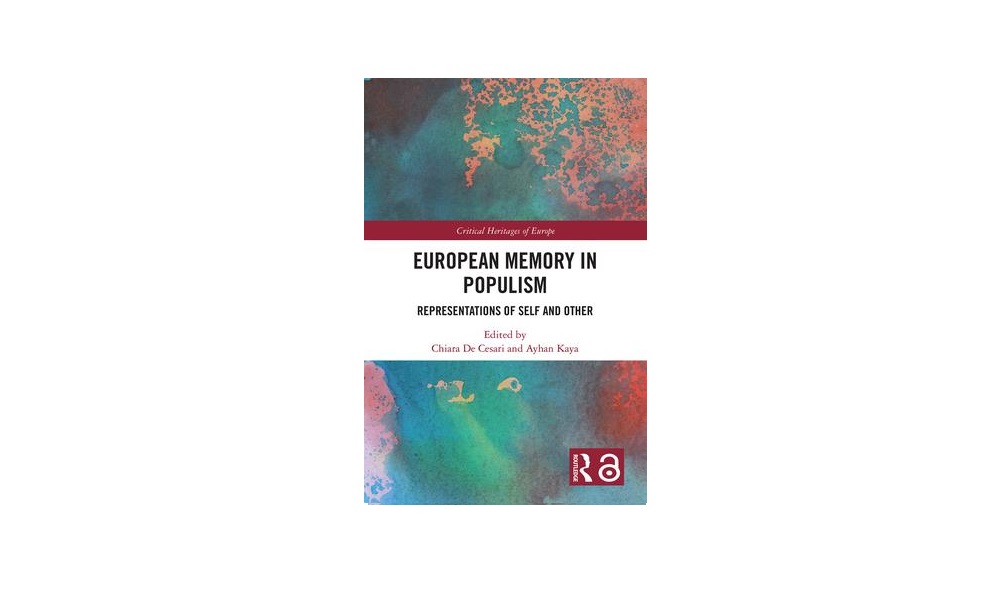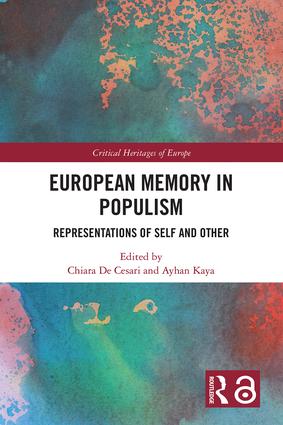
New Edited Volume: European Memory in Populism Representations of Self and Other
European Memory in Populism explores the links between memory and populism in contemporary Europe. Focusing on circulating ideas of memory, especially European memory, in contemporary populist discourses, the book also analyses populist ideas in sites and practices of remembrance that usually tend to go unnoticed. More broadly, the theoretical heart of the book reflects upon the similarities, differences, and slippages between memory, populism, nationalism, and cultural racism and the ways in which social memory contributes to give substance to various ideas of what constitutes the ‘people’ in populist discourse and beyond. Bringing together a group of political scientists, anthropologists, and cultural and memory studies scholars, the book illuminates the relationship between memory and populism from different angles and in different contexts. The contributors to the volume discuss dominant notions of European heritage that circulate in the public sphere and in political discourse, and consider how the politics of fear relates to such notions of European heritage and identity across and beyond Europe and the European Union. Ultimately, this volume will shed light on how notions of a shared European heritage and memory can be used not only to include and connect Europeans, but also to exclude some of them.
For further information, please visit: https://www.routledge.com/European-Memory-in-Populism-Representations-of-Self-and-Other-1st-Edition/De-Cesari-Kaya/p/book/9781138318113
About the Editors
Chiara De Cesari is Senior Lecturer in European Studies and Cultural Studies at the University of Amsterdam. She is the author of Heritage and the Cultural Struggle for Palestine (Stanford University Press, 2019), and co-editor of Transnational Memories (de Gruyter, 2014, with Ann Rigney). She has published widely in journals such as Current Anthropology, American Anthropologist, Museum Anthropology, Memory Studies and the International Journal of Middle East Studies. Her research focuses on memory, heritage and cultural politics, and how they intersect with current transformation of the nation-state form; memories of colonialism and cultural racism in Europe; the transnational museum; Palestine/Israel. Her most recent project explores the globalization of contemporary art and forms of creative institutionalism and statecraft.
Ayhan Kaya is Professor of Politics and Jean Monnet Chair of European Politics of Interculturalism at the Department of International Relations, Istanbul Bilgi University. He received his PhD and MA degrees at the University of Warwick, UK. Some of his latest books are Turkish Origin Migrants and their Descendants: Hyphenated Identities in Transnational Space (Palgrave, 2018), Islam, Migration and Integration: The Age of Securitization (Palgrave, 2012) and Europeanization and Tolerance in Turkey (Palgrave, 2013).
About the Series Critical Heritages of Europe
The Critical Heritages of Europe series seeks to explore the cultural and social politics of the European past in the present. Bridging theoretical and empirical research, the series accommodates broad understandings of Europe – a shifting and historically mutable entity, made both of internal tensions and exogenous encounters, re-imaginings and influences. ‘Heritage’ too is taken as an expansive paradigm, made in myriad practices where the past is valorised for the present, from folk traditions to museums and memorials, the management of historic sites and traditions, and everyday matters such as education, political discourse, home life, food consumption and people’s relations with place. Books in the series engage with European heritages in critical times – in all senses – when Europe and mobilizations of its heritages and memories are called upon to solve problems, and when contests over the meanings of the past are part of wider social and political relations and tensions. Heritage practices are variously informed by civil and uncivil visions, the politics of difference and co-presence, difficult pasts, relations with the ‘outside’, borders, margins, and migrations. Critical questions include:
- What is the European past made to do in the present and for the future?
- What counts as European heritage? To whom, and why?
- How and why do relationships with, and attitudes to, the past inform identity positions, social orders and moral values in, or in relation to, Europe?
- When and where in the (wider) world do European heritages configure identities?
- What are the contemporary meanings and effects of global encounters, mobilities and trajectories in which Europe has played roles?
- What theoretical and critical perspectives can be articulated to contribute new understandings of European heritages? How might these be made relevant for current and future heritage practice?
- What are the relations between theory, criticality, ethics and heritage practice in the European dimension?



